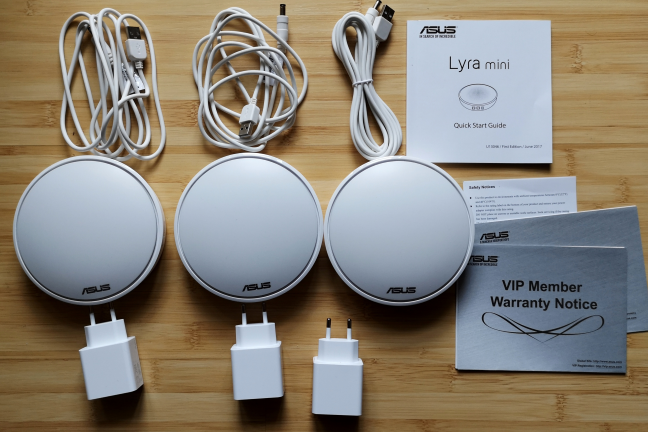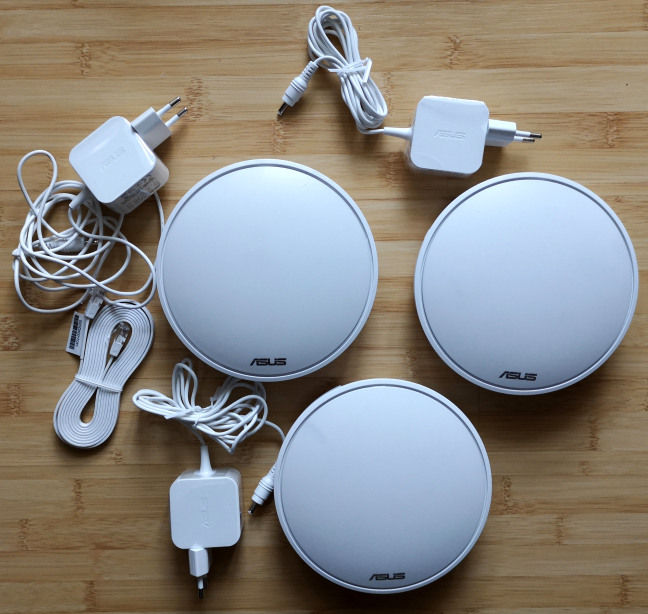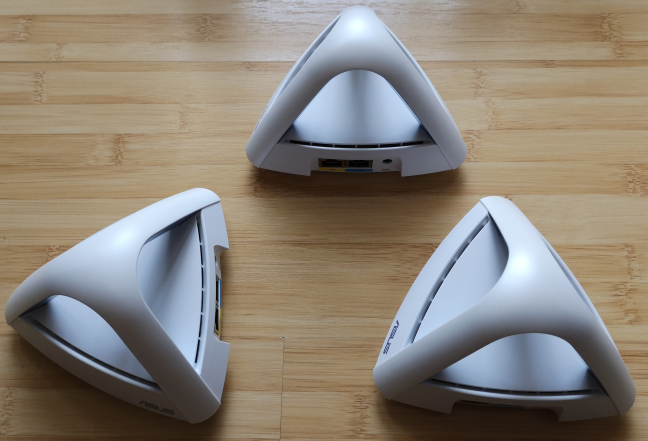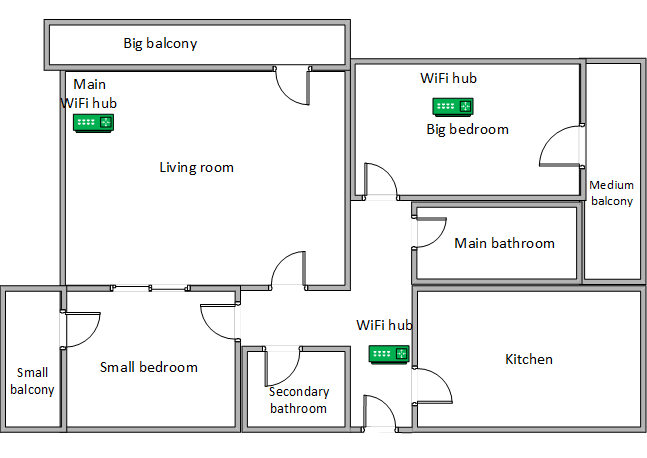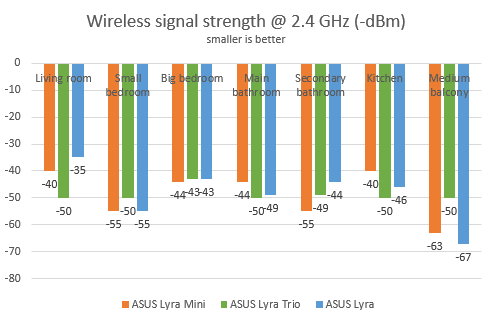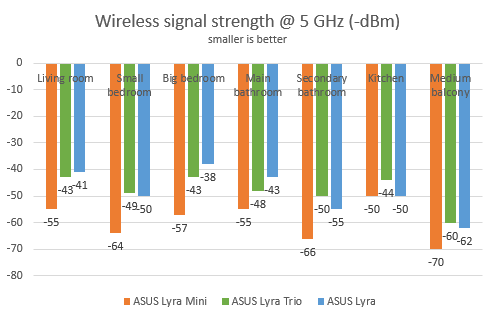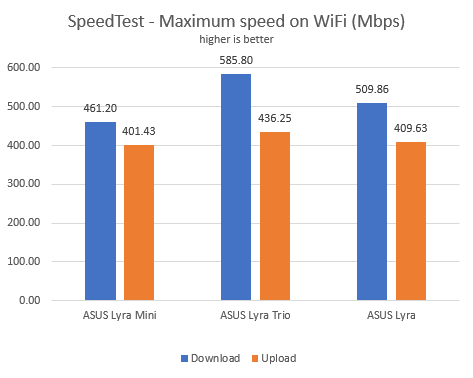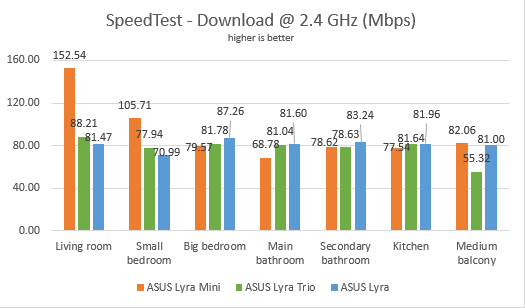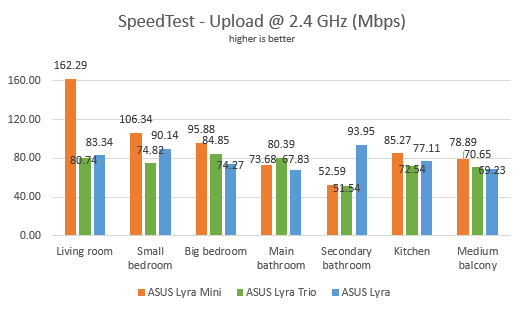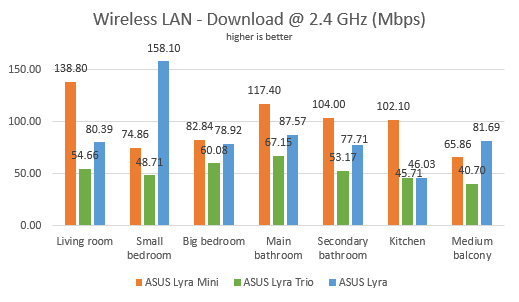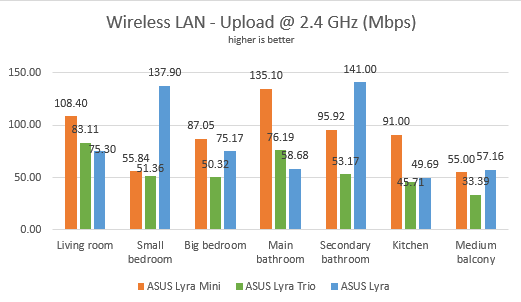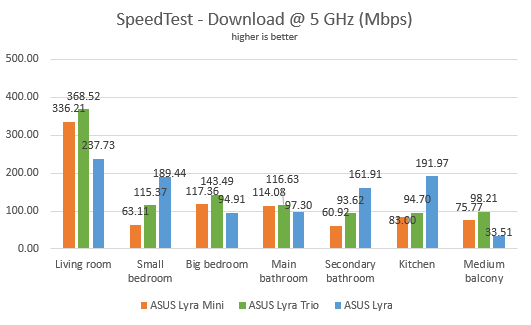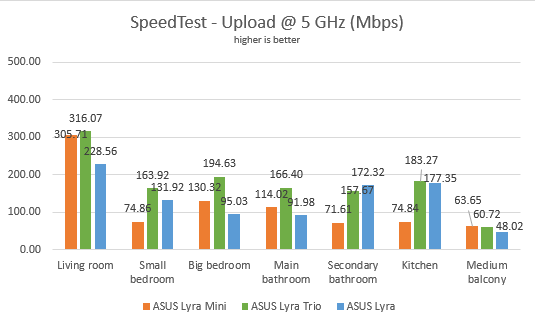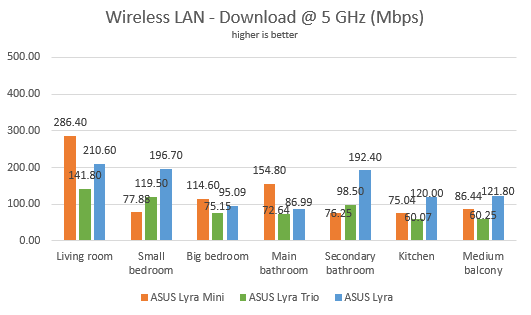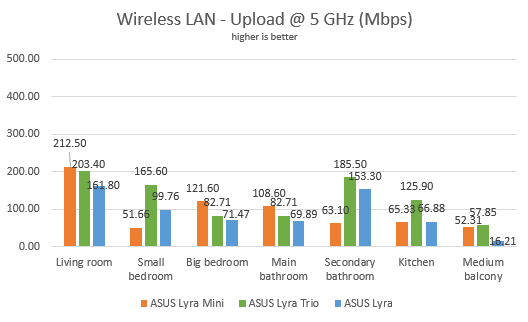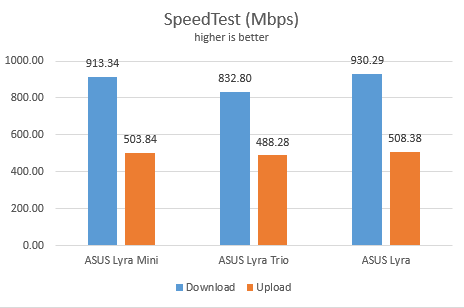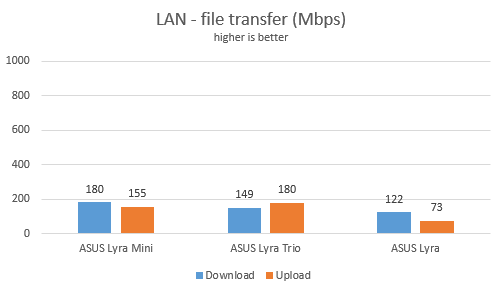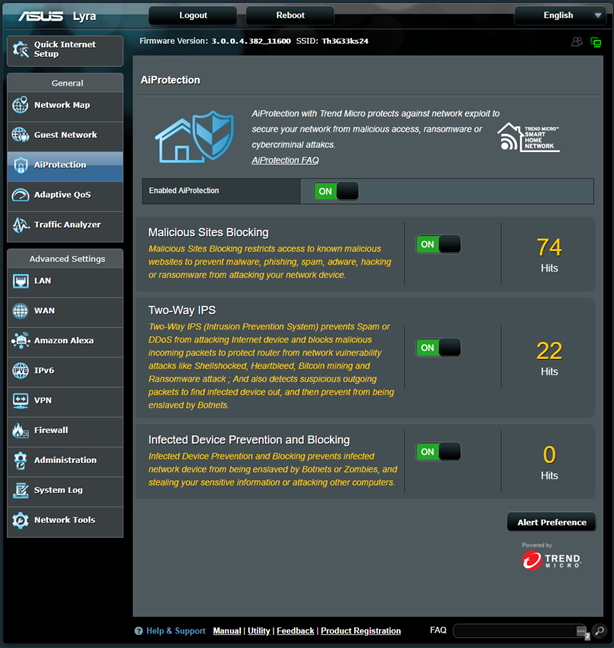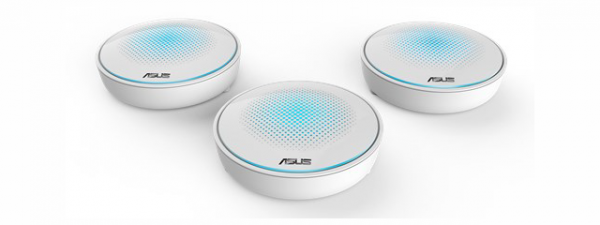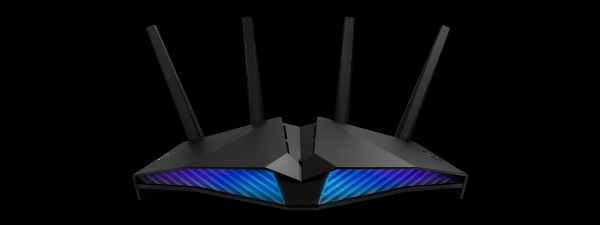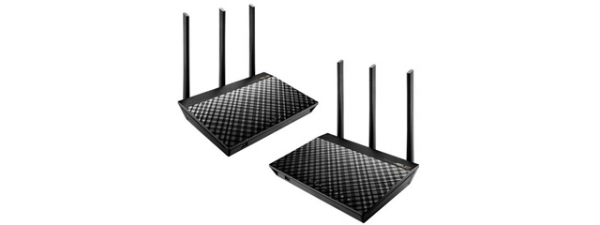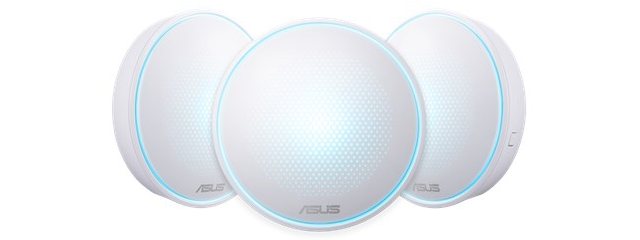
ASUS has launched three different mesh wireless systems, all of them named Lyra. They began with ASUS Lyra, then ASUS Lyra Trio and now they are launching the ASUS Lyra Mini. Except for the price and their looks, it is difficult to tell them apart and understand what is different between the three models. That's why we decided to make a detailed comparison which covers: their looks, hardware, wireless signal coverage, wireless performance, Ethernet connection speeds, security features, and price. There is a lot of ground to cover, so let's get started:
Comparing the looks of the ASUS Lyra mesh systems
ASUS Lyra Mini and ASUS Lyra have the same look and a similar size. Below you can see an ASUS Lyra Mini mesh WiFi system with three stations.
And here is the bigger brother: ASUS Lyra. You cannot tell them apart from the Minis. Can you?
However, the ASUS Lyra Trio stations have a distinct look, and we like them better. But, other users may feel differently. Looks always get a subjective evaluation.
Comparing the hardware of the ASUS Lyra mesh systems
The hardware configuration of the three ASUS Lyra systems is similar. ASUS Lyra and ASUS Lyra Mini are almost identical. Take a look at the table below to see what's inside each Lyra model.
The only significant difference between Qualcomm IPQ4018 (used in ASUS Lyra Mini) and Qualcomm IPQ4019 (used in ASUS Lyra) is the fact that the latter offers a higher peak speed, which is noticeable in real life only when high-end wireless network cards are used, like ASUS PCE-AC88. On most wireless devices, this difference is not noticeable.
When it comes to the total maximum bandwidth, ASUS Lyra is the better choice, with a total of 2134 Mbps. However, ASUS Lyra is a tri-band system, while the other two are dual band. One of the three bands is used by ASUS Lyra exclusively for communicating between the stations that make up the kit, to ensure a more stable wireless coverage for all clients. Lyra Mini and Lyra Trio do not have this feature.
Wireless signal coverage. Winner: None!
We measured the signal strength for all three mesh WiFi systems, in all the rooms in our apartment. You can see how it was set up, in the diagram below:
We started with the 2.4 GHz wireless band. There was no clear winner. Sometimes the more expensive ASUS Lyra was better, while other times, the cheaper ASUS Lyra Mini delivered the best signal strength.
When we evaluated the signal strength on the 5 GHz wireless band, the fight was close between ASUS Lyra and ASUS Lyra Trio. ASUS Lyra Mini was inferior to the other two systems.
Unfortunately, there is no clear trend, and there is no ASUS Lyra that beats the others when it comes to the strength of the wireless signal that is broadcast to network clients.
Maximum WiFi speed potential. Winner: ASUS Lyra Trio!
This test was fun to perform because we used the best possible wireless network card available on the market: ASUS PCE-AC88. We ran SpeedTest on a desktop computer with this card. The computer was in the same room as the main Lyra station, which was connected to the internet service provider. In this test, ASUS Lyra Trio predictably won because it is the only mesh system from ASUS with support for 3x3 MU-MIMO transfers. The other two offer 2x2 MU-MIMO.
ASUS Lyra was also predictably faster than ASUS Lyra Mini because its processor has a higher peak speed, as shared in the technical specifications.
The trouble is that in real life most users do not notice these differences, because they do not have such high-end wireless network cards on their devices. The following tests are a lot more meaningful to the real-life experience of using these devices.
The speed on the 2.4 GHz wireless band. Winner: ASUS Lyra Mini!
We performed two sets of measurements on the 2.4 GHz wireless frequency. The first was using SpeedTest, to see how fast the internet connection is when using the wireless network on the 2.4 GHz band. Then, we used the PassMark Performance test to transfer data between two computers connected to the network. This test showed the speed you get when making network transfers on the 2.4 GHz wireless band.
When we measured the downloads with SpeedTest, the fastest mesh system was ASUS Lyra Mini, in many rooms but not all.
The same was true when measuring the upload speed.
When we measured network transfers with the PassMark Performance test, ASUS Lyra Mini was still the leader of the pack, but in some rooms, the ASUS Lyra outpaced it.
The same was true when measuring the upload speed with PassMark Performance test.
Looking at the results we got, ASUS Lyra Mini delivers the fastest wireless networks on the 2.4 GHz band. Sometimes, it is outpaced by ASUS Lyra.
The speed on the 5 GHz wireless band. Winner: ASUS Lyra Trio!
We performed the same measurements on the 5 GHz wireless band too. With conventional everyday network devices, when running SpeedTest, we achieved the maximum download speed while using the ASUS Lyra Trio, but only in the room where the central station was placed. In other rooms, Lyra Trio was outperformed by ASUS Lyra.
When measuring the upload speed with SpeedTest, the speed champion was ASUS Lyra Trio. Its support for 3x3 MU-MIMO wireless transfers delivered better speed.
In the PassMark Performance download test, ASUS Lyra tended to deliver the best speeds in most rooms, with a few exceptions, where ASUS Lyra Mini outperformed it.
In the upload test, ASUS Lyra Trio climbed up the chart and delivered the best overall performance.
When it comes to the speed of the wireless network on the 5 GHz frequency, ASUS Lyra Trio tends to be the best choice, due to its support for 3x3 MU-MIMO transfers. However, it is not always the speed champion, as the other mesh systems can outperform it. But, if you look at the average of our test results, ASUS Lyra Trio delivers relatively consistent results.
The speed of Ethernet connections. Winner: None!
The trouble with wireless mesh systems is that they have only two Ethernet ports per station. Also, since they tend to be connected to each other through wireless radio frequencies, you can enjoy just one Ethernet connection running at 1 Gbps, on the main station that is connected directly to the internet.
We ran SpeedTest on a desktop computer connected to the main Lyra station. The fastest was ASUS Lyra, due to its higher peak speed. ASUS Lyra Mini was a close second best.
We ran a network transfer between the two desktop computers, each connected with an Ethernet cable to a different Lyra station. Since the stations were connected to each other wirelessly, the transfer was mediated through WiFi. We used PassMark Performance test for this measurement. As you can see, the transfer speeds we got were not impressive. ASUS Lyra Mini delivered the fastest downloads, and ASUS Lyra Trio the fastest uploads.
It is difficult to determine a clear winner when using Ethernet connections on ASUS Lyra wireless systems.
Comparing the security features
When it comes to features, all ASUS Lyra systems share the same. All Lyras are managed through the ASUS Lyra mobile app for Android and iOS. The best part is that they all benefit from advanced antivirus protection and a two-way intrusion prevention system. You also get infected device prevention and blocking, so that infected devices do not spread security problems through your network.
The parental controls are also well done. Parents can create simple rules and schedules, and the parental controls know what content to block and when, automatically, without the need for manual maintenance of blacklists. Most mesh WiFi systems made by other companies do not include such advanced security features as the ASUS Lyra lineup. Others offer similar features but for a limited time, and then you have to pay extra.
Price comparison
ASUS Lyra and Lyra Trio were launched a while ago. ASUS Lyra Mini is available in Europe, but not yet in the United States. According to what little information that we could find on the web, it will be launched at a price of $299. However, we think that the price will go down quite fast so that it reflects the slightly inferior hardware configuration. We believe that you will soon find it on the US market with a price of about $249.
If you want to purchase any of the Lyra systems, you can find them on Amazon, here: ASUS Lyra, and ASUS Lyra Trio.
Which ASUS Lyra do you like best?
Now you know how the three ASUS Lyra systems compare to each other, what is different, and what is the same in all three. Before closing this article, we would like to know which you would choose. Do you want to buy an ASUS Lyra Mini or do you prefer the Trio? Or you have your sights set on the first ASUS Lyra? Comment below and let's discuss.





